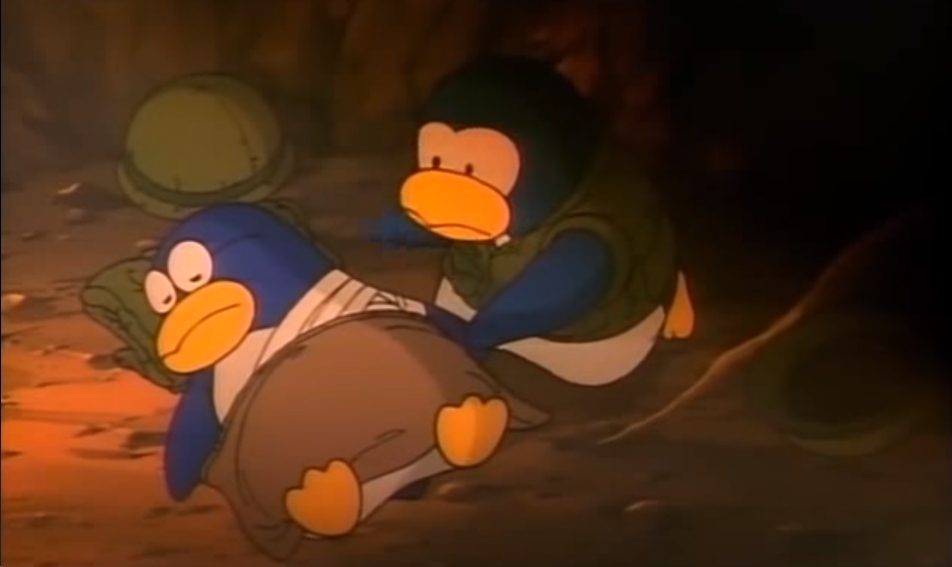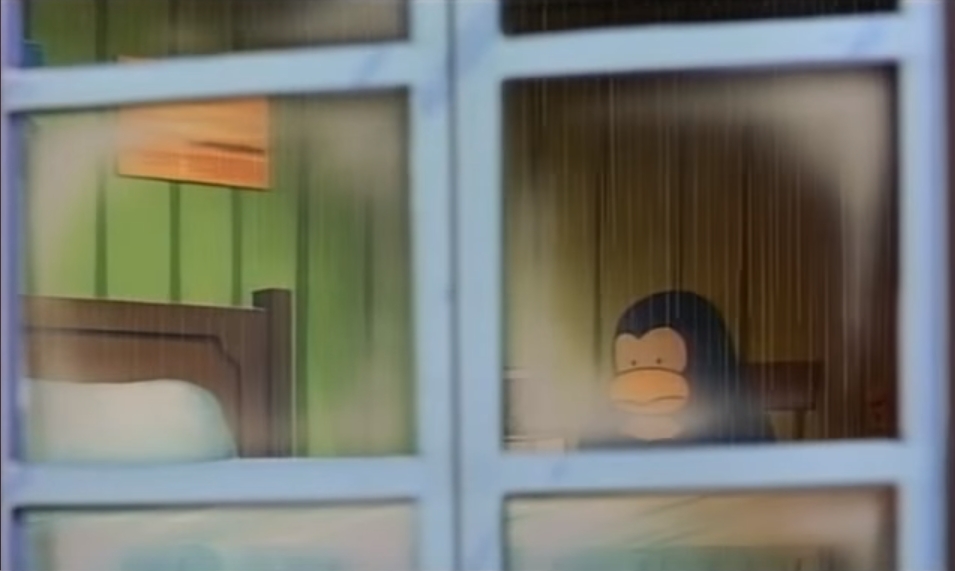A Penguin’s Memory: A One-of-a-Kind Vietnam Drama
It's the story of a Vietnam veteran's post-war trauma - told with penguins.
Mike is still haunted by his time on the battlefield. The roar of the rotor blades; the screams of dying civilians; his best friend falling in a hail of bullets. Like so many soldiers of his generation, Mike’s left forever changed by the Vietnam war. Also: Mike’s a penguin.
It only takes a brief look through the history of Japanese anime to see just how diverse it can be in terms of style and subject matter. You’ll find shows about cooking and poker; straight-to-video stories that take in sci-fi, horror and erotica. There are movies aimed at children and plenty aimed at adults and everyone in between. You’d be hard pressed, we argue, to find anything quite as singular as A Penguin’s Memory – a 1985 post-war drama told entirely with impossibly cute aquatic birds.
Reading about A Penguin’s Memory‘ origins, and you’d be forgiven for thinking it’s all horrendously ill-advised. Mike (and his girlfriend Jill, who we’ll get to later) first appeared in a string of animated TV commercials for Suntory Beer, all of which had a smoky, faintly melancholy atmosphere. These ads, which first aired in 1983, were obviously quite popular; Mike and Jill became Suntory Beer’s mascots for a while, with their faces appearing on the company’s drinks cans as well as a wide range of merchandise (thanks, by the way, to the Twitter account Mondo Mascots for bringing all this to our attention).
Eventually, the decision was clearly made to explore the story of Mike and Jill further. Why was Mike so solitary and filled with angst? What prompted him to take up amateur boxing? How did he and Jill meet? A Penguin’s Memory was the feature-length result.
Far from a feature-length ad for beer, though, A Penguin’s Memory is a surprisingly heartfelt melodrama; once you get over the curious sight of penguin left isolated and psychologically scarred by his wartime experiences, the story proves to be artfully told and curiously affecting.
Dramatically, A Penguin’s Memory appears to take its cue from the string of movies that came out of America in the wake of the Vietnam conflict. There are obvious parallels with Michael Cimino’s The Deer Hunter (1979), in that the greater part of the movie takes place at home rather than on the battlefield; there are hints of Hal Ashby’s Coming Home (1978), the lonely drifter parts of First Blood (1982) and perhaps even the lesser-known romance, Purple Hearts (1984).
A Penguin’s Memory distances itself from the real conflict by referring to it as the Delta War; all the same, it’s clear where we are from the opening frame. Machine gun fire and rockets set a South East Asian jungle ablaze; Mike and his comrades, one of them badly injured, take refuge in a cave and talk about their lives back home. Softly spoken and keen on French poetry, Mike’s evidently a sensitive soul, which makes what happens next all the more cruel: he attempts to save a caravan of roaming civilians from being cut down by American helicopters swooping down from above, which results in the death of his friend and a bullet catching his wing. Mike’s trauma is further compounded when his another comrade falls to his death as they’re flown out of the warzone.

Invalided out of the army, Mike returns home a changed man. His friends and family want to hear about his stories of action and bravery; Mike just wants to forget. “So Mike, how many did you kill?” one friend asks, in the midst of a deeply uncomfortable surprise party. “Hey, you must’ve been lonely,” another coos.
Increasingly withdrawn from his old life, Mike packs a bag and leaves town. He eventually settles in a new community, where he gets a job as a librarian – he’s surrounded by his favorite books on poetry, which become a refuge. He meets a local girl, Jill, who wears a flower in her hair and dreams of becoming a professional singer. A romance blossoms between the two, even as complications arise – a wealthy surgeon who already has designs on Jill, a seedy music manager who thinks he can turn Jill into a star. But all the time, the question lingers: can Mike allow himself to re-engage with his own emotions, or will he – weighed down by his trauma and survivor’s guilt – reject the chance to live a peaceful, happy life?

According to Anipages, A Penguin’s Memory was produced by Takao Kosai, whose other work appears to have been largely confined to the fast-moving world of TV anime: Rainbow Brite, Hello! Spank and Panda! Go Panda (an early piece by Isao Takahata and Hayao Miyazaki) are among his credits on IMDb. The rest of the animation team, including director Shunji Kimura, appear to be the same group that worked on those Suntory adverts.
Although their work is simply rendered, it’s thoughtfully done and, once you get over all the cute blue penguins, full of effective touches. There are striking uses of close-ups and unusual camera angles that capture Mike’s isolation and sadness. Like the story itself, there’s an uncluttered simplicity to its design, from the painted backgrounds, which are packed with atmosphere, to the character animation, which is both chunky and bold yet surprisingly detailed in places.

Beyond its connection to the Suntory commercials, it’s hard to say what the addition of penguins does for the story itself. Certainly, it doesn’t serve an allegorical function like the cats and mice in Art Spiegelman’s graphic novel, Maus. Nor does it have a satisfying meaning like the protagonist of Hayao Miyazaki’s Porco Rosso, an ace fighter pilot who also happens to be a pig. But then again, the use of aquatic birds does have some dramatic impact: it’s oddly heartbreaking to see a bunch of penguins fired on by army helicopters. (A Penguin’s Memory also has some incidental similarities to later works by Miyazaki; like The Wind Rises, A Penguin’s Memory mines French poetry – in this case, Apollinaire – for its underlying themes.)
Somehow, the use of penguins cuts through the apathy we might feel from seeing dozens of other war films and their atrocities. By viewing everything through a whimsical filter, familiar dramatic situations take on a raw, unfamiliar hue.

It’s difficult to find a great deal of information about A Penguin’s Memory online, but it seems that this was the one and only film Suntory’s mascots ever appeared in. There are suggestions on some parts of the web (such as TV Tropes) that Konami owned the rights to the blue penguin design, which appeared in a range of its videogames, though we can’t find confirmation of that from anywhere official.
While the movie itself seems in danger of fading from memory – at present, it doesn’t appear to be available on disc – A Penguin’s Memory remains a fascinating footnote in the history of anime. Certainly, there’s never been another post-Vietnam drama like it, before or since.